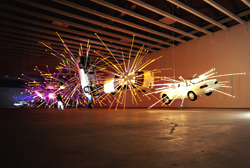“How close can you get to something that terrifies you?” That is the question explored by artists Alex Schweder, Richard Barnes, and Charles Mason in “Murmurs,” their fascinating new installation at Howard House, which is terrific in both senses of the word. Each winter, tens of thousands of starlings swarm to the Rome suburb of EUR, which also happens to be the site where Mussolini once planned the Universal Exhibition, his unrealized homage to fascism. The three artists capture this beautiful and eerie phenomenon in video, audio, and photographs. It’s an inspired collaboration that draws on the subject’s rich multisensory possibilities. Barnes’ striking large-format photos (inkjet prints on archival paper, pictured) of the birds taken from a distance are so studded with dark images they char the white paper like flocking or crushed velvet. Some of the formation shapes seem too surreal to believe—funnels, teardrops, an unfinished question mark. Videographer Schweder’s four-channel projection allows you to stand in the midst of the swirling mass. Composer Mason’s sound recordings of an individual starling and their entire flock are split into three channels, each piped into a different space of the gallery, overlapping as you pass from one room to the next. Together, the artists succeed in both echoing and drawing visitors into the strangeness and wonder of the birds’ behavior. “It’s not just about birds,” says Schweder. “It’s about a moment of being overwhelmed, of being caught up in a crowd, of being consumed by something.” The setting also adds an intriguing—and somewhat ominous—historical and sociopolitical element to the installation, inviting parallels between the dark clouds of birds acting seemingly mindlessly en masse, and the equally frightening human tendencies that can lead to extremist behavior. Though perhaps unintended, one of the most powerful observations “Murmurs” presents is the rather vivid allegory of the sky-darkening potential of mass acquiescence. SUE PETERS
Terrific Storms
Fascinating new installation at Howard House.







